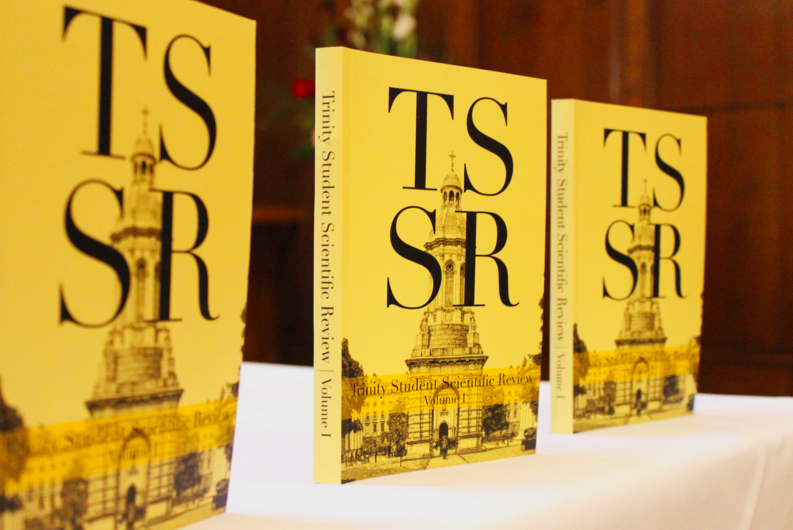Following its successful inaugural year, the Trinity Student Scientific Review (TSSR) is back again to offer undergraduate students the chance to submit a review on a scientific topic of their choosing. Successful applicants will get the opportunity to get their reviews published in TSSR’s annual journal under the following four categories: environmental, evolutionary and earth sciences, molecular and cellular biosciences, chemistry and physics.
Nothing to lose, much to gain
As any budding scientist will know, for a successful career in academic research, publications are vitally important. Initially inspired by the more established Student Economic Review which has been running now for almost thirty years, TSSR came about in order to give undergraduate students an opportunity to be published. It provides a great opportunity for all participants to gain valuable experience in researching a specific area of either biology, chemistry or physics and putting together a scientific review, a view shared by many of those involved in bringing TSSR back this year. Taking part would provide great experience, particularly for those looking to go into research, in putting together a well-structured, analytical piece of work that summarises the current developments in a topic that has been chosen. As James Orr, TSSR’s publication’s manager put it, “it is not a magazine, it’s a journal” for undergraduates to showcase what they are made of.
A wide range of topics
While many students would be more preoccupied with memorising lecture material for their annual exams, TSSR encourages students to engage more with the research side of science, especially at an earlier stage of their academic career. One of TSSR’s advantages is that students can choose and research any area of science they wish. They are not limited to the content they encounter in their course nor are they told specifically what to write about. The choice is completely theirs. It’s a great opportunity for people to look outside of what is currently being taught to them on the curriculum. This year’s physics editor Blaise Delaney agreed with this, stating “especially in physics, there are a few topics that maybe people are not too exposed to and it’s a great opportunity to research into this.” As this year’s chemistry editor and receiver of last year’s best freshman prize, Kate Reidy put it, “It would be great to get a great variety in the chemistry section to show the diverse interest of Trinity chemistry students as well as other disciplines.”
Participation of professors
The reviews that are to be published will be chosen by the editors and their academic advisors. All the reviews submitted go through a rigorous selection process that is supported by current professors from the various departments. “We have a great academic backing” said this year’s TSSR’s general manager Alison Hennessy, “We’re so touched by how the departments have been so understanding and helpful”. Kate expressed gratitude to all the professors who have taken time out to ensure that a high standard of the selection process is upheld, stating “It really couldn’t happen without them”. Professor Mike Southern from the Department of Chemistry is one of the professors who returns as an academic advisor return this year.
Structure, structure, structure
It is understandable that many people at an undergraduate level, in particular freshmen, would have never have written a review before. As a result, some may find the TSSR programme to be intimidating and as a result may become discouraging from participating. For these people, it is important to keep in mind that the editors understand that a lot of people are new to this. From talking to a few of the people involved in putting together the second issue of TSSR this year, one thing stands out. “First thing I’m looking for is that it is coherent”, said Kate. Indeed, a good structure and layout is valued by more than one of the editors. Adding to Kate’s comment, Blaise mentioned that what he’s looking for is “a coherent piece of work where there’s been a lot of attention to a few aspects…. such as abstract, plagiarism and graphs”. Out of the reviews that will be chosen for publication, prizes will be awarded for the best essays in environmental, evolutionary and earth sciences, molecular and cellular biosciences, chemistry and physics. Prizes are also going for overall best essay as well as best freshman essay. The general manager has expressed hope that a session will be organised for the winners to present their reviews to an audience.
Moving on
“We want to make sure that it’s a lasting publication”, the general manager Alison reflected looking to the future. Part of making TSSR a lasting publication would involve financial stability. Last year, TSSR was largely funded by the Faculty of Engineering, Mathematics and Science (FEMS) and continues to do so. This year, efforts have been made to add to this, with one or two companies taking an interest to support and finance the programme in the future. Looking forward to this year, all the people involved expressed enthusiasm for the coming year. James Orr managed to summarised it in one sentence “I’m really looking forward to this year, it will be really cool”.
For more information
For those who are looking for more tips and on how to write a scientific review and also information of how to take part, the group is hoping to hold an information evening. For updates, and for more information, keep an eye on TSSR’s website, trinityssr.com, as well as their Facebook page and posters displayed on College noticeboards. Participants can also contact the editors directly with any questions.







